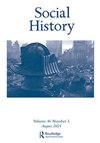‘Dear Aunty Eleanor’: Eleanor Roosevelt, Anna Freud and the politics of emotion in letters by children in war
IF 1.1
1区 历史学
Q1 HISTORY
引用次数: 0
Abstract
ABSTRACT In this article I argue that the actual and imaginary presence of America looms large in the letters written to Eleanor Roosevelt by refugee children whom she sponsored through the organisation Foster Parents’ Plan for War Children (Plan). In doing so, I historicise the politics of emotion in war by examining how the concept of ‘America’ provided a positive haven for refugee children who constructed an imaginary ‘America’ – a place of security and peace – through which they discussed the fragmentation of their lives. When considering the visceral aspects of wartime experience, however, not all children found comfort in the ‘American’ imaginary. The letters of children such as eight-year-old Rosemary Hayward – who was also observed by psychoanalysts Anna Freud and Dorothy Burlingham – reveal an emotional fragility towards this notion of ‘America’. The comfort and plenty of ‘America’ was not easily appropriated by Hayward as the way in which she experienced family dislocation became pronounced. While the emotional security of the concept of ‘America’ became the cornerstone of correspondence between financial foster parents and the refugee child, it served to consolidate this exchange and the politics within it, leaving the scars of family disruption and violence in war painfully unresolved.《亲爱的埃莉诺阿姨》:埃莉诺·罗斯福、安娜·弗洛伊德和战争中儿童来信中的情感政治
在这篇文章中,我认为在埃莉诺·罗斯福(Eleanor Roosevelt)的信件中,美国的真实存在和想象的存在都很突出,这些信件是由埃莉诺·罗斯福通过“寄养父母战争儿童计划”(Plan)组织资助的难民儿童写给她的。在此过程中,我通过研究“美国”的概念如何为难民儿童提供积极的避风港,从而将战争中的情感政治历史化,难民儿童构建了一个想象中的“美国”——一个安全与和平的地方——通过这个地方,他们讨论了他们生活的碎片化。然而,当考虑到战争经历的内在方面时,并不是所有的孩子都能在“美国”的想象中找到安慰。精神分析学家安娜·弗洛伊德和多萝西·伯林厄姆也观察了八岁的罗斯玛丽·海沃德等儿童的来信,这些来信揭示了她对“美国”概念的情感脆弱性。“美国”的舒适和丰富并不容易被海沃德所接受,因为她经历家庭错位的方式变得明显。虽然“美国”概念的情感安全感成为经济上的寄养父母和难民儿童之间通信的基石,但它巩固了这种交流和其中的政治,留下了家庭破裂和战争暴力的伤疤,痛苦地没有得到解决。
本文章由计算机程序翻译,如有差异,请以英文原文为准。
求助全文
约1分钟内获得全文
求助全文
来源期刊

Social History
HISTORY-
CiteScore
1.10
自引率
0.00%
发文量
37
期刊介绍:
For more than thirty years, Social History has published scholarly work of consistently high quality, without restrictions of period or geography. Social History is now minded to develop further the scope of the journal in content and to seek further experiment in terms of format. The editorial object remains unchanged - to enable discussion, to provoke argument, and to create space for criticism and scholarship. In recent years the content of Social History has expanded to include a good deal more European and American work as well as, increasingly, work from and about Africa, South Asia and Latin America.
 求助内容:
求助内容: 应助结果提醒方式:
应助结果提醒方式:


